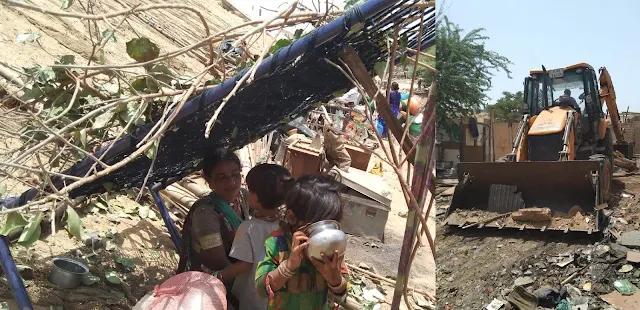 |
| Women display letters containing rakhi for PM |
Poor labouring families, including seasonal or long-term migrants of nearly 15 squatter settlements -- working as construction and casual workers and petty vendors, providing cheap but critically important labour for Ahmedabad city, living under plastic sheetings -- have reminded the Gujarat and Central Governments about the promise made by Prime Minister Narendra Modi of building 50 lakh dwellings, wherein every pavement dweller and homeless would be given a decent home by the end of 2022.
Holding a meeting in Ahmedabad under the aegis of the Majur Adhikaar Manch, they also referred to the appeal of the Prime Minister to poor and labouring women, seeking his support as brother by sending rakhis to protect their humble basti dwellings and provide them with decent housing, which is secure for them and their families. So far, about 300 women have posted rakhis to the Prime Minister along with a letter making the plea.
Many among those who live in the squatter settlements are poor tribal families from the eastern Gujarat districts and Madhya Pradesh. Then there are others who belong to the Scheduled Castes, Other Backward Classes and Nomadic and Denotified Tribes (NT-DNTs). All of them are forced to live on city footpaths, along rail-tracks and under bridges, for they cannot afford expensive rental accommodation for their families in Ahmedabad.
They have been living in sub-human conditions and have nearly no access to basic public utilities like water, sanitation and electricity, and access no services of ICDS, schooling or healthcare. Worse, these squatter slums face regular eviction threats of demolition by the authorities of the Indian Railways, the Ahmedabad Municipal Corporation (AMC), and the Gujarat government.
In May and June 2022, Indian Railways and AMC authorities demolished several such bastis without any or with incomplete notices to squatters living in Arjun Ashram, Nirnay Nagar and Umiya Hall areas. They live along the Ahmedabad-Botad rail-line. A similar fate befell the Amul Garden squatter slum living along the rail line to Rajkot.
These basti residents have been residing in these areas for the last nearly two decades. Currently, a petition filed in the matter is pending in the Gujarat High Court. They were exposed to record breaking hot climate in June and torrential rains in July.
It is not just a question of three or four squatter settlements. The Majur Adhikar Manch, which has taken up their cause, has listed 40 such squatter settlements in Ahmedabad. It has represented and made appeals to the authorities, including the Indian Railways, the AMC and the state government, but to no avail.
The National Rehabilitation Policy, as also several High Court and Supreme Court orders, have from time to time directed the authorities to facilitate proper rehabilitation before eviction. In 2020, after the migrant labour crisis during the lockdown, affordable rental housing policy and schemes were announced. Unfortunately, all these remain on paper and lack clear implemention guideline.
A survey of urban homeless was undertaken in 28 cities of Gujarat after a rap from the Supreme Court in 2018. The Apex Court asked the authorities to facilitate accommodating to such persons along with their families in 24x7 shelters, but the order remains unimplemented. Nor are there any clear guidelines for the implementation of the order in Ahmedabad. Also, the outdated Gujarat Rehabilitation Policy, 2013, and lack of any rehabilitation policy with the Indian Railways, has forced the urban poor labouring families to live in insecure homelessness.
Keeping these critical issues in view, the Majur Adhikar Manch has demanded from the concerned authorities the following:
*Respectively: President, Vice President, General Secretary, Majur Adhikar Manch, Gujarat
 |
| Demolition of a squatter settlement |
The National Rehabilitation Policy, as also several High Court and Supreme Court orders, have from time to time directed the authorities to facilitate proper rehabilitation before eviction. In 2020, after the migrant labour crisis during the lockdown, affordable rental housing policy and schemes were announced. Unfortunately, all these remain on paper and lack clear implemention guideline.
A survey of urban homeless was undertaken in 28 cities of Gujarat after a rap from the Supreme Court in 2018. The Apex Court asked the authorities to facilitate accommodating to such persons along with their families in 24x7 shelters, but the order remains unimplemented. Nor are there any clear guidelines for the implementation of the order in Ahmedabad. Also, the outdated Gujarat Rehabilitation Policy, 2013, and lack of any rehabilitation policy with the Indian Railways, has forced the urban poor labouring families to live in insecure homelessness.
Keeping these critical issues in view, the Majur Adhikar Manch has demanded from the concerned authorities the following:
- Survey all squatter slums on any kind of land in the city, and register their presence in the Municipal Corporation, create their unique identity, and list all resident families as eligible for decent housing.
- Provide basic Utilities and Public Services to all such squatter slums with immediate effect.
- Update the Gujarat’s Rehabilitation Policy 2013, and reform the cut off date to Dec. 2018, and also expand the PMAY, and other relevant housing schemes to provide low-cost housing, or plots, or affordable rentals with priority to the urban homeless in squatter slums.
- The requirement of several ID and address proofs must be managed by the governments, and issued by the relevant authorities easily.
*Respectively: President, Vice President, General Secretary, Majur Adhikar Manch, Gujarat

Comments